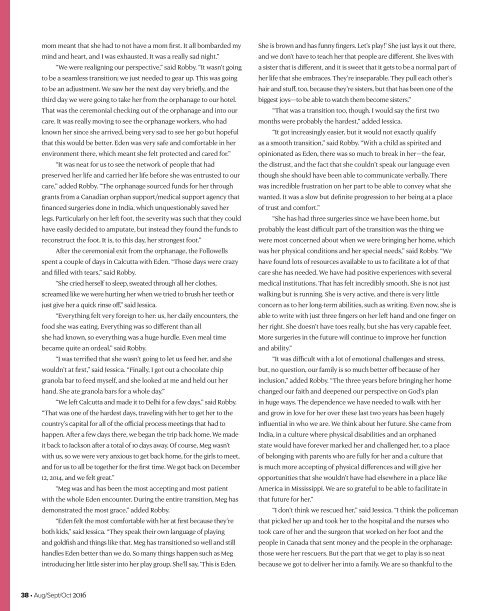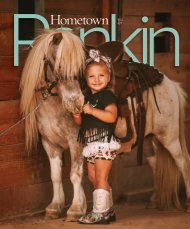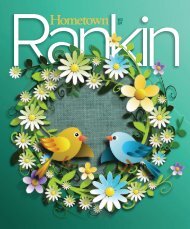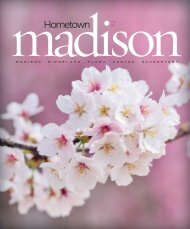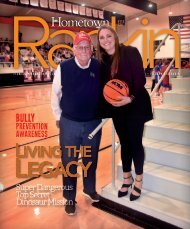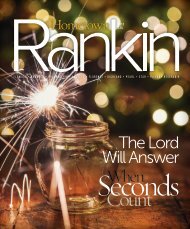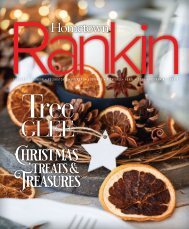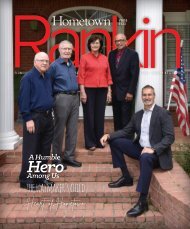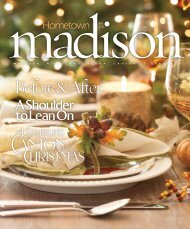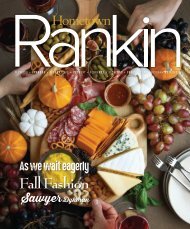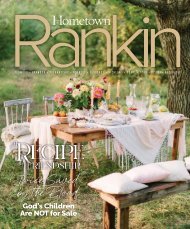Create successful ePaper yourself
Turn your PDF publications into a flip-book with our unique Google optimized e-Paper software.
mom meant that she had to not have a mom first. It all bombarded my<br />
mind and heart, and I was exhausted. It was a really sad night.”<br />
“We were realigning our perspective,” said Robby. “It wasn’t going<br />
to be a seamless transition; we just needed to gear up. This was going<br />
to be an adjustment. We saw her the next day very briefly, and the<br />
third day we were going to take her from the orphanage to our hotel.<br />
That was the ceremonial checking out of the orphanage and into our<br />
care. It was really moving to see the orphanage workers, who had<br />
known her since she arrived, being very sad to see her go but hopeful<br />
that this would be better. Eden was very safe and comfortable in her<br />
environment there, which meant she felt protected and cared for.”<br />
“It was neat for us to see the network of people that had<br />
preserved her life and carried her life before she was entrusted to our<br />
care,” added Robby. “The orphanage sourced funds for her through<br />
grants from a Canadian orphan support/medical support agency that<br />
financed surgeries done in India, which unquestionably saved her<br />
legs. Particularly on her left foot, the severity was such that they could<br />
have easily decided to amputate, but instead they found the funds to<br />
reconstruct the foot. It is, to this day, her strongest foot.”<br />
After the ceremonial exit from the orphanage, the Followells<br />
spent a couple of days in Calcutta with Eden. “Those days were crazy<br />
and filled with tears,” said Robby.<br />
“She cried herself to sleep, sweated through all her clothes,<br />
screamed like we were hurting her when we tried to brush her teeth or<br />
just give her a quick rinse off,” said Jessica.<br />
“Everything felt very foreign to her: us, her daily encounters, the<br />
food she was eating. Everything was so different than all<br />
she had known, so everything was a huge hurdle. Even meal time<br />
became quite an ordeal,” said Robby.<br />
“I was terrified that she wasn’t going to let us feed her, and she<br />
wouldn’t at first,” said Jessica. “Finally, I got out a chocolate chip<br />
granola bar to feed myself, and she looked at me and held out her<br />
hand. She ate granola bars for a whole day.”<br />
“We left Calcutta and made it to Delhi for a few days,” said Robby.<br />
“That was one of the hardest days, traveling with her to get her to the<br />
country’s capital for all of the official process meetings that had to<br />
happen. After a few days there, we began the trip back home. We made<br />
it back to Jackson after a total of 10 days away. Of course, Meg wasn’t<br />
with us, so we were very anxious to get back home, for the girls to meet,<br />
and for us to all be together for the first time. We got back on December<br />
12, 2014, and we felt great.”<br />
“Meg was and has been the most accepting and most patient<br />
with the whole Eden encounter. During the entire transition, Meg has<br />
demonstrated the most grace,” added Robby.<br />
“Eden felt the most comfortable with her at first because they’re<br />
both kids,” said Jessica. “They speak their own language of playing<br />
and goldfish and things like that. Meg has transitioned so well and still<br />
handles Eden better than we do. So many things happen such as Meg<br />
introducing her little sister into her play group. She’ll say, ‘This is Eden.<br />
She is brown and has funny fingers. Let’s play!’ She just lays it out there,<br />
and we don’t have to teach her that people are different. She lives with<br />
a sister that is different, and it is sweet that it gets to be a normal part of<br />
her life that she embraces. They’re inseparable. They pull each other’s<br />
hair and stuff, too, because they’re sisters, but that has been one of the<br />
biggest joys—to be able to watch them become sisters.”<br />
“That was a transition too, though. I would say the first two<br />
months were probably the hardest,” added Jessica.<br />
“It got increasingly easier, but it would not exactly qualify<br />
as a smooth transition,” said Robby. “With a child as spirited and<br />
opinionated as Eden, there was so much to break in her—the fear,<br />
the distrust, and the fact that she couldn’t speak our language even<br />
though she should have been able to communicate verbally. There<br />
was incredible frustration on her part to be able to convey what she<br />
wanted. It was a slow but definite progression to her being at a place<br />
of trust and comfort.”<br />
“She has had three surgeries since we have been home, but<br />
probably the least difficult part of the transition was the thing we<br />
were most concerned about when we were bringing her home, which<br />
was her physical conditions and her special needs,” said Robby. “We<br />
have found lots of resources available to us to facilitate a lot of that<br />
care she has needed. We have had positive experiences with several<br />
medical institutions. That has felt incredibly smooth. She is not just<br />
walking but is running. She is very active, and there is very little<br />
concern as to her long-term abilities, such as writing. Even now, she is<br />
able to write with just three fingers on her left hand and one finger on<br />
her right. She doesn’t have toes really, but she has very capable feet.<br />
More surgeries in the future will continue to improve her function<br />
and ability.”<br />
“It was difficult with a lot of emotional challenges and stress,<br />
but, no question, our family is so much better off because of her<br />
inclusion,” added Robby. “The three years before bringing her home<br />
changed our faith and deepened our perspective on God’s plan<br />
in huge ways. The dependence we have needed to walk with her<br />
and grow in love for her over these last two years has been hugely<br />
influential in who we are. We think about her future. She came from<br />
India, in a culture where physical disabilities and an orphaned<br />
state would have forever marked her and challenged her, to a place<br />
of belonging with parents who are fully for her and a culture that<br />
is much more accepting of physical differences and will give her<br />
opportunities that she wouldn’t have had elsewhere in a place like<br />
America in Mississippi. We are so grateful to be able to facilitate in<br />
that future for her.”<br />
“I don’t think we rescued her,” said Jessica. “I think the policeman<br />
that picked her up and took her to the hospital and the nurses who<br />
took care of her and the surgeon that worked on her foot and the<br />
people in Canada that sent money and the people in the orphanage:<br />
those were her rescuers. But the part that we get to play is so neat<br />
because we got to deliver her into a family. We are so thankful to the<br />
MEG HAS TRANSITIONED<br />
SO WELL AND STILL<br />
HANDLES EDEN BETTER<br />
THAN WE DO. SO MANY<br />
THINGS HAPPEN SUCH<br />
AS MEG INTRODUCING<br />
HER LITTLE SISTER INTO<br />
HER PLAY GROUP.<br />
SHE’LL SAY, ‘THIS IS<br />
EDEN. SHE IS BROWN<br />
AND HAS FUNNY<br />
FINGERS. LET’S PLAY!’<br />
38 • Aug/Sept/Oct <strong>2016</strong> <strong>Hometown</strong> <strong>Clinton</strong> • 39


